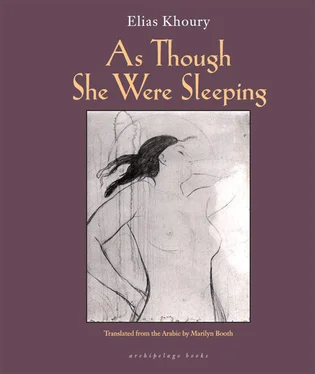Milia had become ill. She came down with an inexplicable headache which no one could diagnose. Everyone was stymied and anxious. She bound her temples with a handkerchief soaked in water to lighten the pain. She peeled raw yams and put slices against her forehead tied in the damp cloth. Why did she forget the story of the voices that nested in her ears and made her incapable of speech? Why did she erase from memory the brief coma that, unbelievably, God had saved her from?
The story goes that Milia was alone in the house when she fell. She was standing in the kitchen stirring curdled milk in a large pot over the gas flame. Musa was the first to come home and he saw his sister lying flat on her back on the floor, as the smells of yogurt and simmering kibbeh filled the place. He tried to wake her up by throwing some orange-blossom water into her face. But she seemed too deeply asleep to awaken. He picked her up in his arms and carried her to bed and went out at a run to get the doctor. He came back with Dr. Naqfour to find that his sister had regained consciousness and the nun with her brass censer in hand was stalking around the girl’s bed muttering prayers.
The doctor did nothing at all. He simply kissed the nun’s hand when she told him all was well, and left. The nun bent over Milia’s ear and whispered something. Two days later Mansour appeared and that was the beginning of the love story that conducted Milia all the way to marriage.
That night, the story goes, Milia dreamed the dream that determined the future course of her life. Did she see the blue woman when she fell in the kitchen? Or did she see her amidst the cloud of incense? Or did the whole business occur through the machinations of the nun?
It was a story of love at first sight, Mansour would tell his mother and brother. As for the question of what Sonia Rahhal had to do with it, this was a mere trifle. After a tiring day spent in Souq Tawile choosing the right fabrics for his new shop in Nazareth, Mansour accepted a dinner invitation from his friend the merchant Samir Rahhal. Over dinner, the merchant’s wife, Sonia, drew him into conversation, urging him to get married. He must go out to the garden and see the prettiest girl in Beirut, she said.
That is how the story began. Milia stood canopied in the branches of the flowering almond tree. Her cream-white complexion mingled into the almond blossoms and enflamed the heart of the man who had come from Nazareth.
It doesn’t matter if Sonia was the nun’s friend. The sister had nothing to do with it. I didn’t even see her until the wedding. No, the nun wasn’t involved. I loved you from the first glance, and that’s all there is to it.
Milia closed her eyes and didn’t open them again until she felt herself submerged in water. She turned toward Mansour but he was not beside her in bed.
She screamed, here was the water, and she was aware of Mansour getting her up and helping her to dress and taking her to the hospital.
MILIA CLOSED HER EYES AND SAW.
Everything was white. Coming to her, the doctor’s voice was muffled in cotton.
She saw two nurses. One held her right hand and the other stood at the end, beneath her spread-apart legs. The first was older, the second one young, but otherwise, two unassuming women as alike as two drops of rain-water. The first was short and so was the second; the first was stooped and had bowed legs, and the second equally so. What had brought Wadiia here?
Twinlike, mother and daughter circled round Milia and issued orders in voices indistinguishable from each other. Now a voice coming from her right, now the same voice from below. The pregnant woman listens to a sound like waves swelling from deep in her belly, as if the child who has dropped his head ready to tumble into the world wants for one last time to use the language of the womb that he will forget so soon. Milia listens and wants to tell him not to be afraid.
Somewhere behind the two nurses’ voices coming to her in peremptory tones she sees a shadow-shape wrapped in fog. It’s the doctor. No — it’s Khawaja Massabki. What has brought him and his two Wadiias here?
Khawaja Massabki stands in front of the glowing stove rubbing his hands together over the flame. He narrows his eyes as if he is the bridegroom while the two women, mother and daughter, stand awaiting his instructions.
She remembers she was sleeping. She remembers her scream, crying out to him, The water! That is when the fog suddenly descended to wrap itself around her. Mansour, I don’t want to go to Shtoura! My love, I want to go home.
Carrying a lit candle, Mansour strides ahead of the car. Where did you find the story of the candle? True, I did get out of the car to walk ahead, but does anyone carry a candle in such wind and snow and cold? And then, if I had walked in front of the car, we would not have reached the hotel.
Milia does not feel like talking the story over with this man. She is weary of trying to fix her memories. Memories aren’t fixed — you remember things in one way and I in another, and in the end it doesn’t really matter. You want me to remember things as you see them. With all due respect, that’s not the way it goes. Please, please, tell the driver to hurry! I’m so tired.
She sleeps as the car sways and shudders in the snowstorm that pounds Dahr el-Baydar. The driver is begging her to help him convince this fool of a man that they must turn around and head back to Beirut.
Why do you say that?
The bridegroom is mad, madame! Please help out. Damn this crazy idea. Look, I don’t want to make this trip. Can’t a person get married without going to Shtoura! Now help me out, please.
What was this man saying?
Lord, where am I? I want to go home. Mansour, where are you?
She knelt in front of the door to the bathroom and heard his hoarse retching. She knocked and begged him to open the door. She said she would ask Khawaja Massabki to get a doctor.
But Mansour refused. From beneath the coughing his voice sounded haltingly, telling her to go back to bed and wait for him. It was the cheese, he said. Don’t eat that cheese — it’s gone bad. Go on, go to sleep and I will be there. Don’t be afraid.
She did not say anything but she was afraid. She was dreaming of a different dream. Marriage, Najib told her, makes a woman soft and warm, just like perfect bread dough. I want to knead you, he said, and put you in the oven and bake you and watch you rise. Come closer.
They were in the garden. The evening shadows bumped against the pair of frangipani trees whose branches arced over the garden entrance.
I love frangipani: flowers of seduction. Futna . . fitna . Do you know why it is called that? Because it is like a woman. It entices you, then seduces you; it twines a man in and makes him lose his mind.
. .
Because on the outside, the petals, it’s white and the center is yellow, and it gives off two scents, one for each color, and when they blend they become seduction and chaos! Fitna . What do you think of my explanation?
. .
Come closer so I can tell you what I think.
She pressed herself against the tree trunk, her back meeting its contours. Her right arm was raised against it and her hand brushed a branch thick with blossoms.
This is what drives me mad, he said pointing to her arm. I just want to put my lips here –
Watch out you don’t come any closer! Someone might see us.
I told you, you are like that yellow and white flower. Just one kiss! With one swift movement he grabbed her around her middle and pulled her to him.
Ayyy, she screamed.
Scream if you want to, said the nurse.
Milia opened her eyes to see a white hospital screen. She was choking on the odor, she said. Why did the blossoms smell like this?
Читать дальше












